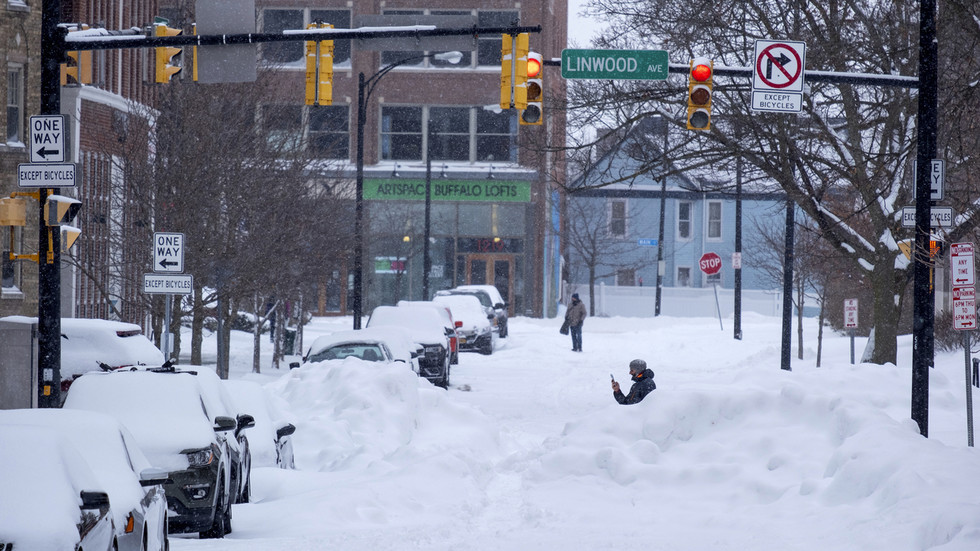
At least 49 people are now dead as a result of a “once-in-a-generation” winter cyclone

People move about the streets of the Elmwood Village neighborhood of Buffalo, New York,December 26, 2022 © AP / Craig Ruttle
The winter storm that hammered more than half of the US over Christmas weekend has killed at least 49 people, according to a tally by the Associated Press. 27 of these deaths happened in western New York alone.
The storm, caused by the collision of warm, moist air from the south with cold, dry air from the north, hit the US east coast from the Great Lakes near Canada to the Rio Grande along the US-Mexico border, according to the National Weather Service (NWS). Out West, an atmospheric river event – caused by a plume of moisture coming inland from the Pacific Ocean – brought heavy rain and snow from Washington down through Oregon and into California on Monday.
Some 49 people were killed nationwide, the Associated Press reported on Monday, with 27 of them in the region of Buffalo, New York. Buffalo experienced four feet (1.25 meters) of snow on Sunday, and most of those killed in the area were either trapped in their cars or homes, or died as they shoveled snow.
NEW VIDEO: Snow drifts are reaching the height of SUVs in the Buffalo area as this historic blizzard gradually winds down. Some cars have been abandoned in the middle of roads during the height of the lake-effect snowstorm. #NYwx#snowpic.twitter.com/0v90aofgsX
— WeatherNation (@WeatherNation) December 25, 2022
A picture from cheektowaga that describes this storm perfectly. pic.twitter.com/MQEGupkOjy
— BuffaloWeather (@weather_buffalo) December 25, 2022
With rescue vehicles mired in the snow, New York Governor Kathy Hochul urged residents of parts of Erie, Niagara, Orleans and Genesee counties on Monday to obey ongoing driving bans. Hochul imposed these bans late last week, before deploying several dozen members of the National Guard to the region.
In Canada, four people died on Saturday as a bus rolled over on an icy highway around 200 miles (320km) east of Vancouver.
READ MORE: Freezing weather hammers US energy output – Bloomberg
The storm caused power outages affecting a peak of around 1.7 million US homes and businesses on Saturday, and led to the cancellation of thousands of flights. According to flight tracking website FlightAware, 3,000 flights were canceled and more than 4,900 delayed on Monday.
The cyclone, described as a “once-in-a-generation” event by meteorologists, also caused the US’ natural gas production to drop by 10% on Saturday, the largest single-day decline in more than ten years.




